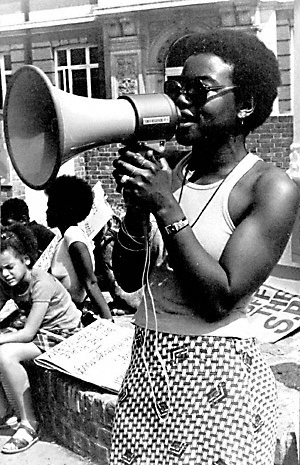Olive Elaine Morris was a community leader and activist in the 1970s. She campaigned for access to education and housing rights and fought against state and police oppression.
AN INDELIBLE, IF ANONYMOUS, MARK
Olive was born on 26 June 1952 in Harewood, St Catherine’s, Jamaica, to Doris and Vincent Nathaniel Morris. After her parents left Jamaica for London, she lived with her maternal grandmother until she was nine, when she and her brother Basil joined their parents in Lavender Hill.
Olive attended local state schools, before dropping out at 15 to focus her efforts on the civil rights movement.
STRUGGLE IN THIS COUNTRY
In 1968 Olive became a part of the British Black Panther Movement, of which she would become a core member. Along with others from the Movement, in 1974 she set up the Brixton Black Women’s Group, the first network for women of colour in Britain. The Group sought to address the specific issues faced by black women, and to offer solidarity and advice to those in difficulty.
On 15 November 1969, Olive was hanging out with friends at a record store. Outside, Nigerian diplomat Clement Gomwalk, was confronted by police, who falsely believed that he was driving a stolen car. At the time, “sus” laws enabled police to stop and search people solely on the suspicion of wrongdoing. Then, as now with stop and search powers, people of colour were disproportionately the target of such searches. Seeing the police begin to beat Gomwalk, Olive intervened. She was assaulted and racially abused by the police, and arrested. She was strip searched and threatened with rape while in police custody, and was ultimately fined £10 and given a three-month suspended sentence.
Among the numerous demonstrations Morris organised was a protest outside local council offices in 1972, campaigning for safer heating in social housing after two children had died in a fire started when their portable heater was knocked over. Knowing that police threats to arrest the protestors would not apply to children, Olive sent the youngest demonstrators into the council offices. Minutes later, the head of the housing department agreed to look into the matter. Central heating was soon installed.
Olive began squatting in underused buildings in 1972. She and her friend Elizabeth Obi established a squat at 121 Railton Road in 1973, which became an organising centre for community groups and the home of a black community bookshop. 121 Railton Road remained a squatted social centre until it was closed in 1999, making it one of the longest running squats in British history.
Olive was offered a scholarship to study economics and sociology at Manchester University, despite not having any formal qualifications, in 1975. While she was studying, Olive became involved in the Manchester Black Women’s Co-operative and the Black Women’s Mutual Aid Group and helped to establish a supplementary school after campaigning with local black parents for better education provision for their children.
After graduating in 1978, Olive and her friend Stella Dadzie founded the Organisation of Women of African and Asian Descent. The Organisation would go on to become a force throughout London, mobilising women of colour to challenge inequalities and state oppression, particularly in housing and education.
Olive travelled widely, including a visit to China as part of a student delegation. She left impressed with what Chinese socialism had accomplished, which she attributed to the role of the people in building societal structures. She also travelled to Morocco, Algeria, Spain, France, and Hong Kong.
IN FACT, SHE TOOK THE LEAD
Olive died on 12 July 1979 in St Thomas’ Hospital, after falling ill with non-Hodgkin lymphoma the previous year. She was 27.
In 1986, Lambeth Council renamed 18 Brixton Hill the Olive Morris House following a campaign by the Brixton Black Women’s Group.
The Remembering Olive Collective was established in 2008 to preserve information about Olive’s life, and in 2015 Olive became a face of the Brixton Pound, a currency designed to support businesses local to South London.
There are currently plans to demolish the Olive Morris House as part of Lambeth’s New Town Hall development. Following the reformation of the Remembering Olive Collective as the ROC 2.0 in 2019, there is now a campaign to ensure the planned demolition of the building does not equate to the erasure of Olive’s legacy in the borough. There are plans to lay a cornerstone memorialising Olive, and to set up the Olive Morris Memorial Award for young activists. You can read more about the ROC 2.0, and ways to support them, here.
